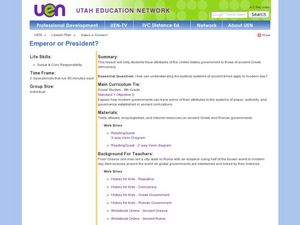Curated OER
Rome: Republic to Empire
Sixth graders discuss the rise of Rome from a republic to a dictatorship. In small groups, they role-play as congress people debating whether or not to give the president more powers. In another activity, 6th graders produce television...
Curated OER
Following the Leaders
Examine the historic election of Pope Benedict XVI and reflect on the challenges he faces as the new leader of the Catholic Church. This New York Times lesson investigates how other world leaders are chosen in different forms of...
Curated OER
An Ancient Greek and Roman Festival
Third graders label a map of ancient Greek and Roman civilizations and do a written report on one element of these two cultures. They participate in discussions of food, farming, daily life and government (among others). Students use the...
Curated OER
Trajan's Rome: The Man, The City, The Empire
Incorporate six lessons on Trajan and ancient Rome into a social studies unit on the Roman Empire. From Trajan's birth to his rise to greatness, the resource uses primary source documents and historical commentary to connect learners...
Curated OER
A Recipe for Democracy - Roman Democracy Lesson Plans
Students can take a look at the political system of Rome through Roman Democracy Lesson Plans.
Curated OER
East Meets West: Rome
Students examine the development of Rome. Using maps, they locate and describe the rise of the Roman Republic. They analyze the government and its significance. They discover the influence of Julius Caesar and trace he migration of...
Curated OER
Going Greek
Third graders learn about the life of a young boy in Greece and all about his cultural heritage. Pupils gather information about the history, culture, and the many influences the ancient Greeks had on modern day society. Terrific video...
Curated OER
Marcus Aurelius
In this Marcus Aurelius worksheet, students read a detailed biographical text of the Roman emperor. Students answer 6 true/false questions and 6 fill in the blank.
Curated OER
Architecture of the Ancient World
You can introduce your students to the amazing world of ancient architecture with these lesson plans.
Curated OER
Reformation Simulation
Students discover the Medieval reformation. For this ethics lesson, students simulate council and government bodies to determine responses to various opinions regarding religion and ethics. They determine what postilions to take and why...
Curated OER
Religion in Politics and Daily Life
Young scholars examine various aspects of religion in ancient Rome including the role of mythology, polytheism versus. monotheism, the treatment of Jews and Christians, and the spread of Christianity.
Curated OER
Civilizations: Abuse Of Power
Young scholars investigate the role of government. In this government lesson, students watch "Civilizations: Abuse of Power," and discuss the responsibilities of government. Young scholars then role play situations in history when the...
Cave Creek Unified School District
Crusades and Culture in the Middle Ages
The Crusades sounds like a glamorous time period in the Middle Ages full of glory—but was it? Scholars find and review the truth of the Crusades' influence on the world through the resource. The study guides, separated individually by...
Curated OER
Guidelines for Governing: Utopia and The Prince
Students explore the power of the Church in government. In this literature lesson, students read Sir Thomas More's Utopia and Niccolo Machiavelli's The Prince. Students respond to questions regarding the works and discuss them.
Curated OER
Comparing the Confessional traditions that Emerge from the Reformation
Ninth graders examine the Protestant Reformation. In this World History activity, 9th graders research various places of worship. Students comapre and contrast the different sects of religion that resulted from the Protestant...
Museum of Tolerance
The Role of Citizens in a Participatory Democracy
Groups research participatory democracies and compare the role and rights of citizens in ancient history with those in recent U.S. history. Guided by a series of questions, individuals compose a persuasive essay in which they discuss the...
Curated OER
Arquitectura
Third graders recognize that communities change over time. For this architecture lesson, 3rd graders discuss buildings in cities and compare to the buildings in Ancient Rome. Students explore the architecture and building of the...
Curated OER
What is a Republican Government?
Students engage in a problem-solving activity examining some of the considerations involved in determining common welfare in creating a republican government.
Curated OER
Democracy: An Introduction.
Students study the U.S. Constitutional System and how it compares with forms of democracy that developed in ancient Greece and Rome. They list and explain the requirements it takes to form a society to be considered a nation.
Curated OER
Emperor or President?
Sixth graders complete a Venn Diagram. In this government comparison lesson plan, 6th graders discuss how rules are similar and different at home, school and in their community. Students learn about the type and structure of the United...
Curated OER
What is a Republican Government?
Students examine why the Founders of our country thought a republican government was best. They discover the Founders based our government on the government of Rome after much research and explore the advantages of a republican government.
Curated OER
Renaiisance In Ancient Egypt
Eleventh graders conduct research about the development of technologies in Ancient Egypt. The research is used to make class presentations. The students work with the teacher in order to create a rubric for the assignment.
Curated OER
Who Was Marc Antony?
Students explore the relationship between Marc Antony and Cleopatra. In this World History lesson, students research Marc Antony, Julius Caesar and Cleopatra, then answer specific questions about how they are all related. Activities...
Constitutional Rights Foundation
Puritan Massachusetts: Theocracy or Democracy?
Was Puritan society governed as more of a theocracy or democracy? After comparing and contrasting a series of primary source documents, middle and high schoolers form small groups and debate the question.

























